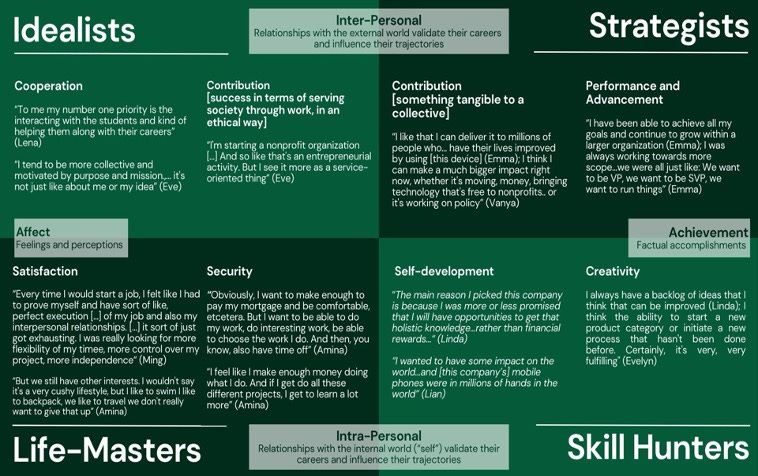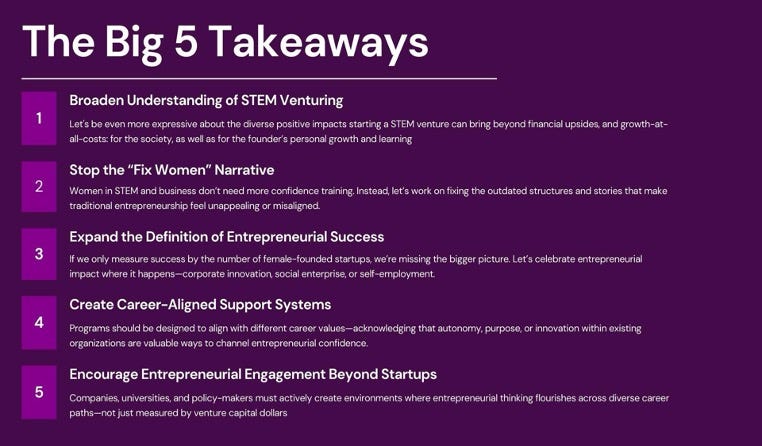"I Could, But Why Should I?" - Unveiling Why Entrepreneurial Women Aren’t Running to Start Tech Companies
Let’s be clear: It is not a lack of competence or confidence.
“I'm very good at my job and I was good at managing a team. I know how to make hardware. If I had to ... develop a consumer electronics product from scratch I could do it. I could pull in the correct people from my own personal network to fill in any gaps and knowledge. So, I'm not concerned that I couldn't learn how or couldn't execute [as an entrepreneur]. It's just like, why?” [Emma, Strategist]
Emma is not an exception. She belongs to a majority of the 17 women with elite STEM education in Silicon Valley whom we interviewed to understand their careers and where entrepreneurship (doesn’t) fit in. As Emma’s quote showcases, these women didn’t lack in entrepreneurial self-efficacy (ESE); they have the know-how and confidence to innovate. In fact they were in a startup hotspot, had access to powerful networks, successfully overcame any gender-related barriers in graduating from elite STEM programs, with the drive to create impact: the perfect recipe for a wave of disruptive female-led founders, right?
Our research challenges us to ask better questions: Their stories show us we have to stop reducing entrepreneurship to “an event” of (not) founding a tech startup, but rethink entrepreneurship as a broader, more inclusive concept. Many of these women are entrepreneurial in other contexts, create success in a number of ways, and choose not to found ventures. And it is not because of their lack of confidence, or competence to found—it’s because their understanding of the system doesn’t align with their career values: many see entrepreneurship as egoistic, limited in impact, and “the wrong way to solve society’s biggest problems”.
Our research, published in the Journal of Business Venturing Insights, dives into this misalignment to challenge the outdated narratives that dominate discussions on (lack of) women in entrepreneurship.
Four Ways High-Potential Women Are Redefining Entrepreneurship
Our research uncovered four distinct career pathways that entrepreneurial women pursue—most beyond the classic founder role —in order to succeed in ways that matter to them:
Skill Hunters – These women thrive on feeling challenged, continuous learning, creativity, and innovation. They are the only women in our sample who see founding a startup as a desirable future possibility (some also started a tech company).
Strategists – They are power players climbing ladders in corporate environments, leveraging their expertise to achieve influence and innovate within organizations rather than outside them. For them, being entrepreneurial isn’t about bootstrapping or wasting time fundraising—it’s about innovating to scale and creating impact with existing resources they can tap into within big corporations.
Life Masters – Feeling autonomous is their North Star. They craft their own career paths through consulting or self-employment, embracing entrepreneurship on their own terms—but without the pressure of other stakeholders that is expected from start-ups.
Idealists – Passionate about societal impact, these women channel their entrepreneurial energy into academia, non-profits, and advisory roles, acting as startup stewards. For them, traditional startup culture often feels ego-driven and misaligned with their core values.
Let’s Flip the Script: Fix the System, not the Women
For decades, the narrative has been about “fixing” women—giving them more confidence, more funding, more encouragement, more mentorship. But the truth? These women don’t need fixing.
They are already entrepreneurial –As Vanya [strategist] told us:
"And at every point in my career, I've invented my job; I've invented a role that never existed, right? I turned up, and I was given a rough set of objectives ... We didn’t have the budget, the staff, the partnerships, or the things that we need, but we can figure it out. And I would argue very, very strongly that I have been an entrepreneur all my life, including the time that I am in [big tech company] now.”
However, women are telling us that Entrepreneurship itself needs a reboot. In their own words:
"We've misdefined entrepreneurship, and as a result, we've led to all sorts of really bad vicious cycles, including all the ethical issues that we have in Silicon Valley ..., whether it's the me-too movement, whether it's Robin Hood and the suicides ... It's actually a problem at Stanford that we're promoting this [ ...]. And I think that's actually a terrible thing. I think it's the wrong way to solve some of the most difficult challenges that we face as a human race right now [ ...].” [Vanya, strategist]
Many of the high-ESE women we interviewed weren’t drawn to Silicon Valley—they saw it as a place that celebrates egoistical pursuit to raise money; parading the founder and C-suite titles; growth-at-all-costs mentality; burnout for an exit. Instead of seeing this as a loss, we should see it as a wake-up call.
If we want top female talent to flourish, we need to evolve our thinking. The ecosystem needs to expand beyond the traditional glorifications of venture-backed startups by: 1) showing that venture founding can be a learning experience and impact creation opportunity beyond just growth-at-all-costs, and 2) Acknowledging that entrepreneurial impact comes in many forms—including those that don’t fit the existing portrayals.
Read the full paper here to find out more: https://www.sciencedirect.com/science/article/pii/S2352673425000034
Author Bios
Hana Milanov is a Professor of Entrepreneurship at the Technical University of Munich, where she explores how entrepreneurs mobilize resources, build ventures, and shape outcomes—increasingly through a gender lens. She received a number of awards for her research and teaching, and recently named one of Germany’s top 20 professors supporting entrepreneurs (Unipreneur). Her activities span academia and practice: she serves on the board of the Center for Digital Technology and Management (CDTM), advises the Spacewalk VC fund, and previously held the role of TUM’s Senior Vice President for Internationalization and Alumni. Before joining TUM, she was a professor at IE Business School and earned her doctorate from Indiana University.
Katharina Prantl works as an Investment Associate for a renewable energy investor in Munich. Previously, she completed her Master's in Management & Technology at the Technical University of Munich, Stanford University, and the National University of Singapore, where she developed a passion for the ambiguity of entrepreneurship. Experiencing the lack of female colleagues sparked her curiosity to look beyond the act of entrepreneurship and engage in the academic debate surrounding this prevailing societal gap.
Sheri Sheppard is a Professor Emerita, Mechanical Engineering–Design Group, Stanford University. A major theme in her research and teaching has been advancing: (a) the representation of underrepresented individuals in engineering education and practice, and (b) how engineering is actually practiced. She is a fellow of ASEE, ASME, and AAAS, and in 2014 was named U.S. Professor of the Year–Doctoral and Research Universities (CASE and the Carnegie Foundation for the Advancement of Teaching). Her early career was in engineering in the U.S. automotive industry, with a focus on structural mechanics.
Xiao Ge is a researcher and adjunct lecturer in the Mechanical Engineering-Design Group, Stanford University. Her research focuses on understanding creative work theory and practice to improve practices of creativity, interdisciplinary teamwork, and engineering education. She teaches design thinking, research-based design theories, and methods of design research. An important goal of her work is to develop theories, empirical studies, and culturally responsive approaches to understand how emotions and feelings that accompany work on ill-defined design problems can be harnessed by engineers and designers to enable and extend their creative process.



